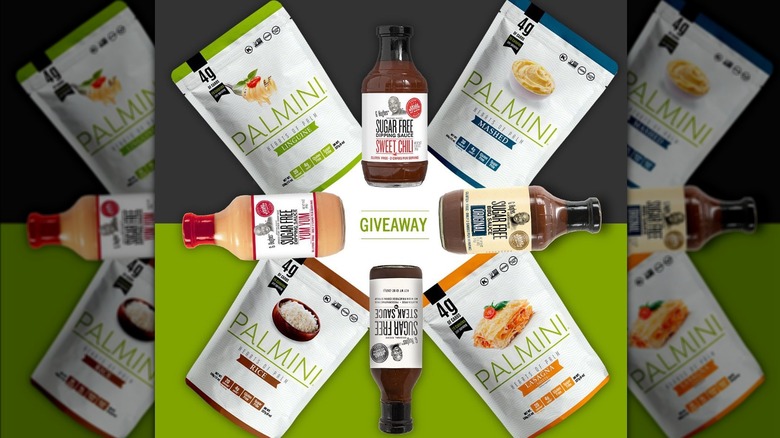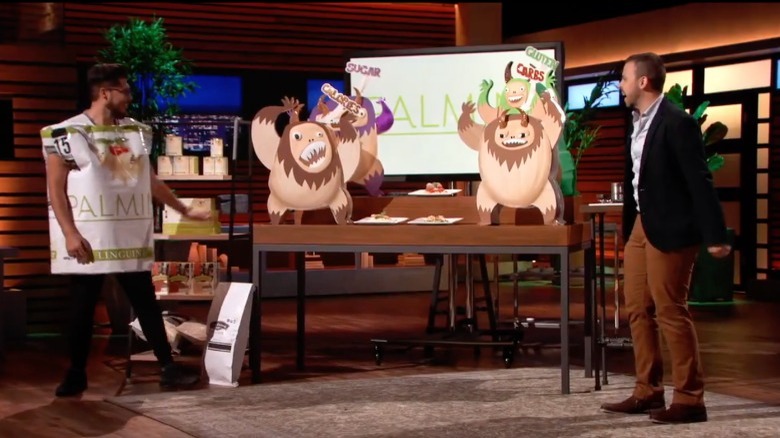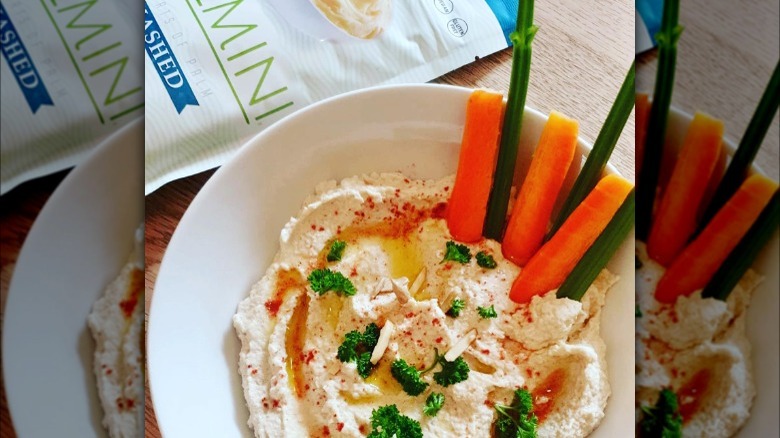What Happened To OA Foods From Shark Tank?
From its action-packed "Shark Tank" pitch to distribution in major grocery stores like Walmart, and Market of Choice, OA Foods is one of the show's success stories. Their flagship product Palmini is a low-carb pasta substitute made from sliced hearts of palm. "Shark Tank" fans may remember Alfonso Tejada's enthusiastic pitch during Season 9 Episode 24 (originally aired in February 2018) where he and a Palmini mascot destroyed models of calories, carbs, and gluten. The introduction grabbed the attention of sharks Lori Greiner, Mark Cuban, Bethenny Frankel, Robert Herjavec, and Daymond John. Tejada then followed up with samples. The sharks had mixed reactions to the taste of Palmini.
One primary concern was that the sharks enjoy investing in patented inventions and natural food products are difficult to patent. Palmini broke past that barrier since OA Foods developed the machine they use to cut the hearts of palms. Also, it's a family company that already had success distributing plant-based foods from Bolivia such as quinoa and chia seed.
OA Foods received an offer from Cuban and Greiner for $300,000 in exchange for 25% equity. He quickly accepted the offer. Tejada told The Alligator he wanted to bring them on board due to their experience with food products. You may be curious whether OA Foods benefited from that "Shark Tank" pitch and whether the exposure and investment led to sustainable success.
Palm is where the heart is
Palmini benefited from the "Shark Tank" bump. Within 24 hours of the episode's debut, they sold their entire stock of 10,000 Palmini cans. Prior to "Shark Tank," they only sold a few cans a day on average.
If you shop at Wegman's, Whole Foods, Balducis, or Walmart, you may have noticed pouches or cans of Palmini on the shelves. The Hearts of Palm pasta substitute sells in grocery stores around the United States, and the brand expanded from the original linguine into lasagne, angel hair pasta, as well as mashed potato, and rice substitutes. In addition to retail, OA Foods sells direct to consumers through its website and Amazon.
Alfonso Tejada told The Food Network that he was inspired to develop Palmini due to the popularity of zucchini noodles or "Zoodles" since in his opinion Hearts of Palm had a better texture as a pasta substitute. While Palmini is OA Foods' best-known product due to its "Shark Tank" appearance, the company also has other plant-based food products like bulk quinoa. OA Foods' Greenfit line remains their OG product.
OA Foods' Greenfit line is still going strong
Greenfit offers plant-based food products like quinoa and chia in bulk. You can buy ten-pound bags of black chia seed or red, white, or tri-color quinoa. In addition, other products include jarred Llajua Bolivian hot sauce.
OA Foods' Greenfit line contrasts with the convenience of Palmini. Palmini is cut, riced, or mashed and pretty much ready to serve from the package or to cook as a substitution for pasta, mash, or rice in any recipe. However, it is where the company started. Alfonso Tejada was a University of Florida graduate who took over aspects of the family business after graduation. In 2017, the year before the "Shark Tank" pitch, OA Foods made $400,000 from selling quinoa. In fact, OA Foods' quinoa business was a selling point for sharks Mark Cuban and Lori Greiner who saw this as a strong position for expansion into other plant-based food products.
Palmini also launched more new products, including fried rice and Spanish rice substitutes made from Hearts or Palm. If you are interested in trying Palmini, consider using this easy Hearts of Palm recipe.


